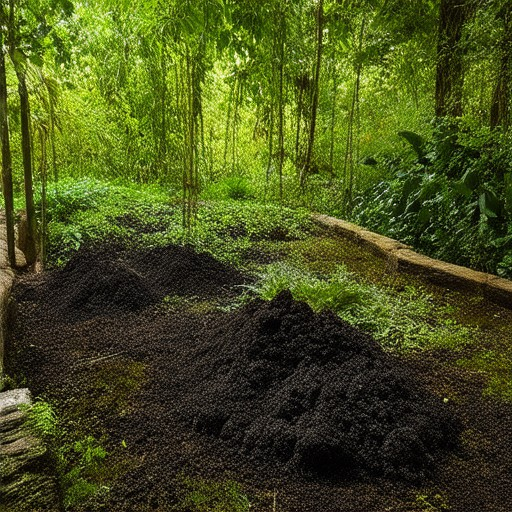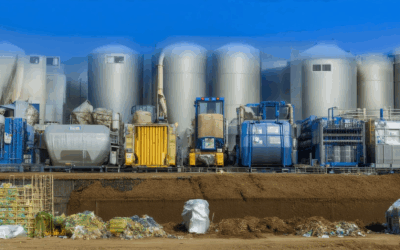The relationship between biochar and ecosystem health has been a hot topic in sustainable agriculture and environmental science. While biochar has gained popularity as a natural amendment for soil improvement, its role in ecosystem health remains a subject of debate. Proponents argue that biochar enhances soil fertility, promotes biodiversity, and acts as a carbon sink, contributing to climate change mitigation. However, critics highlight concerns about potential negative impacts, such as soil degradation under certain conditions and the risk of chemical leaching when applied improperly. As researchers and farmers continue to explore biochar’s applications, questions arise about its overall effectiveness compared to traditional methods like compost. This article delves into the controversies surrounding biochar, examining its benefits, risks, and the broader implications for ecosystem health. By comparing biochar with compost and analyzing the latest research, we aim to provide a comprehensive overview of where each stands in promoting sustainable agricultural practices and environmental stewardship.
Key Takeaways
- Improves Soil Fertility: Biochar enhances soil with essential nutrients like phosphorus, potassium, and magnesium, promoting plant growth and boosting yield.
- Boosts Microbial Activity: It acts as a habitat for beneficial microorganisms, improving soil structure and organic matter decomposition.
- Aids Carbon Sequestration: Biochar stores carbon in the soil, helping combat climate change.
- Adjusts pH Levels: While it generally lowers soil acidity, excessive use can increase pH, requiring careful monitoring.
- Long-lasting Effectiveness: Biochar remains effective for hundreds to thousands of years, ideal for long-term soil improvement.
- Enhances Water Retention: Improves soil moisture retention, reducing the need for frequent watering.
- Provides Slow-release Nutrients: Nutrients are released slowly, benefiting plants over extended periods.
- Fast Decomposition: Compost typically breaks down within one year, offering immediate nutrients to plants.
- Rich in Nutrients: Compost provides essential minerals and micronutrients quickly, supporting plant growth.
- Improves Soil Structure: Enhances soil aeration and water infiltration, promoting healthier root systems.
- Supports Microorganisms: Compost fosters a thriving population of beneficial soil organisms.
- When to Choose Biochar: Ideal for long-term soil enhancement, large-scale applications, and carbon sequestration.
- When to Opt for Compost: Suitable for immediate nutrient needs, small gardens, quick decomposition, and specific plant requirements.

Why is biochar controversial?
Biochar, produced through the pyrolysis of organic materials, has sparked debate due to several concerns:
- Environmental Impact: High-temperature processes involved in biochar production can emit greenhouse gases like CO2 and methane, raising questions about its overall carbon footprint.
- Contamination Risks: The use of diverse organic wastes can introduce heavy metals and toxins, potentially contaminating soil and posing risks to ecosystems.
- Land Use Competition: Large-scale production may encroach on agricultural lands, leading to deforestation and competition with food crops.
- Effectiveness Variability: While some studies highlight soil fertility improvements and carbon sequestration, others question the extent of these benefits, leading to scientific debate.
- Regulatory Gaps: Lack of standardized production regulations can result in inconsistent quality and reliability, complicating adoption efforts.
- Economic Barriers: Production costs often exceed traditional fertilizers, limiting accessibility for small-scale farmers and hindering widespread implementation.
These multifaceted issues contribute to the ongoing discussion about biochar’s viability and potential as a sustainable solution, balancing its ecological benefits against operational challenges and risks.
Understanding the Negative Effects of Biochar
Biochar, a carbon-rich material derived from organic waste through pyrolysis, has gained recognition for its benefits in soil health and agriculture. However, like any agricultural amendment, it carries some potential downsides when misapplied or misunderstood.
- Soil Porosity Issues: Excessive application of biochar can clog soil pores, reducing water infiltration and root oxygen access, which is crucial for plant growth and microbial activity.
- Nutrient Retention and Absorption: Biochar acts as a sponge, absorbing essential nutrients like phosphorus, manganese, and calcium. While this can enhance soil fertility, it may also hinder nutrient availability if these minerals are retained rather than cycling back into the ecosystem.
- Alteration of Soil Structure: Overuse of biochar can change soil texture and structure, potentially disrupting microbial communities and their roles in nutrient cycling and decomposition processes.
- Impact on Microbial Activity: Biochar’s high carbon content can attract microbes, altering their metabolic activities. This shift might reduce the availability of organic matter that plants and soil organisms depend on for sustenance and growth.
- Nutrient Imbalance: In cases where specific nutrients are preferentially absorbed by biochar, it may lead to deficiencies in other nutrients that are critical for plant health, despite overall improvements in soil conditions.
- Long-term Effects on Ecosystems: Prolonged use of biochar without monitoring could disrupt the delicate balance of ecosystems, affecting both plant and animal life that rely on specific nutrient cycles.
It’s important to note that biochar, when used responsibly and in balanced quantities, offers significant benefits to soil health and crop production. However, understanding and managing its application are key to minimizing potential negative effects and maximizing its positive impact on agricultural systems.

Is Biochar Good for the Environment?
Biochar is indeed beneficial for the environment, offering multiple advantages that contribute to ecological health and sustainability.
Improved Soil Health
Biochar enhances soil fertility and structure, promoting plant growth and reducing soil degradation. Its ability to retain moisture improves water availability for plants, minimizing runoff and erosion, which safeguards soil integrity and local water sources.
Carbon Sequestration
Biochar acts as a carbon sink, trapping organic carbon in the soil. This reduces the release of carbon dioxide, aiding in climate change mitigation and contributing to carbon removal efforts.
Pest Control
Biochar exhibits natural pest and disease resistance properties, potentially reducing reliance on synthetic pesticides, which are harmful to ecosystems.
Sustainable Production
Produced through sustainable processes like those at Pyrolysium, biochar aligns with eco-friendly practices, often utilizing renewable energy sources during its creation.
Construction Applications
Beyond agriculture, biochar can be used in construction as a building material, offering an alternative to environmentally detrimental materials like cement and steel.
Comparison with Other Methods
While biochar may not sequester as much carbon as methods like afforestation, its additional benefits in soil health and pest control position it as a valuable tool in broader environmental strategies.
Economic Considerations
Despite initial costs, biochar’s scalability and multiple benefits make it a promising solution for large-scale environmental impact, encouraging further adoption and innovation.
In conclusion, biochar serves as a versatile and effective tool for environmental stewardship, supporting sustainable practices and contributing positively to global ecological health.

About Biochar
Biochar is a versatile and sustainable solution derived from organic materials through a process called pyrolysis. This method heats biomass in low-oxygen environments, transforming it into a fine-grained, blackened material known for its rich nutrient content and ability to enhance soil health.
Benefits of Biochar
- Improved Soil Fertility: Biochar enriches soil with essential nutrients like phosphorus, potassium, and magnesium, promoting healthy plant growth and boosting crop yields.
- Enhanced Microbial Activity: It serves as a habitat for beneficial microorganisms, improving soil structure and organic matter decomposition.
- Carbon Sequestration: As a carbon-rich material, biochar helps combat climate change by storing carbon in the soil, reducing greenhouse gas emissions.
- Adjustable pH Levels: While it generally lowers soil acidity, excessive use can increase pH, so careful monitoring is advised to suit specific crop needs.
Considerations for Using Biochar
- Application Rates: Test small amounts initially to determine optimal use before applying larger quantities to avoid pH imbalance.
- Purity Matters: Ensure biochar is free from contaminants by sourcing from reputable producers to prevent introducing harmful substances into your soil.
Effective Usage Methods
- Mix with compost for a balanced approach to soil amendments.
- Apply directly to the soil to enhance its structure and nutrient profile.
- Use as a soil conditioner to improve water retention and root penetration.
Comparisons and Competitors
Biochar stands out among similar products like activated charcoal due to its specific agricultural applications. While other carbon-based solutions exist, biochar’s focus on soil health and sustainability makes it a unique choice for eco-conscious practices.
For more insights and practical guides on utilizing biochar effectively, explore our resources at Pyrolysium , where we delve deeper into sustainable living solutions.
Is Biochar Toxic?
Biochar, a form of charcoal produced through pyrolysis, is generally considered non-toxic when used appropriately. However, certain factors can influence its safety profile:
- Health Concerns:** While biochar itself is not inherently toxic, prolonged exposure to biochar dust may pose health risks, particularly due to fine particle emissions that could affect respiratory systems.
- Chemical Composition:** The toxicity of biochar can vary based on the feedstock used and the production process. Contaminants like heavy metals or polycyclic aromatic hydrocarbons (PAHs) may be present, though levels typically remain low.
- Organic Matter:** As a product of organic decomposition, biochar contains organic compounds. However, these are generally non-hazardous and may even offer beneficial nutrients when applied correctly.
- Guidelines for Safe Use:** Applying biochar in recommended quantities and avoiding excessive exposure to dust can mitigate potential health risks. Protective measures during handling are advised.
For optimal safety, always refer to current guidelines and consult experts before large-scale application, especially in environments where air quality is a concern.

Comparing Biochar and Compost
When deciding between biochar and compost, it’s essential to evaluate their unique benefits and suitability for your gardening needs.
- Biochar:
- Long-lasting: Biochar remains effective for hundreds to thousands of years, making it ideal for long-term soil improvement.
- Carbon-rich: It adds significant carbon to the soil, enhancing its fertility and structure.
- Water retention: Biochar helps improve soil moisture retention, reducing the need for frequent watering.
- Slow-release nutrients: Nutrients are released slowly, benefiting plants over extended periods.
- Compost:
- Fast decomposition: Typically breaks down within one year, providing immediate nutrients to plants.
- Rich in nutrients: Compost releases essential minerals and micronutrients quickly, supporting plant growth.
- Improved soil structure: Enhances soil aeration and water infiltration, promoting healthier root systems.
- Supports microorganisms: Compost fosters a thriving population of beneficial soil organisms.
When to Choose Biochar:
- If you’re looking for long-term soil enhancement and reduced maintenance.
- For large-scale applications or agricultural settings where sustained fertility is needed.
- When you want to sequester carbon and contribute to climate resilience.
When to Opt for Compost:
- For immediate nutrient needs and quick results in plant growth.
- In small gardens or urban settings where space is limited.
- When you prefer a natural, ready-to-use amendment that decomposes quickly.
- For specific crops or plants that benefit from a rapid supply of nutrients.
Both biochar and compost offer remarkable benefits to your garden. The choice depends on your specific goals, whether you prioritize long-term soil health or immediate nutritional support.




0 Comments